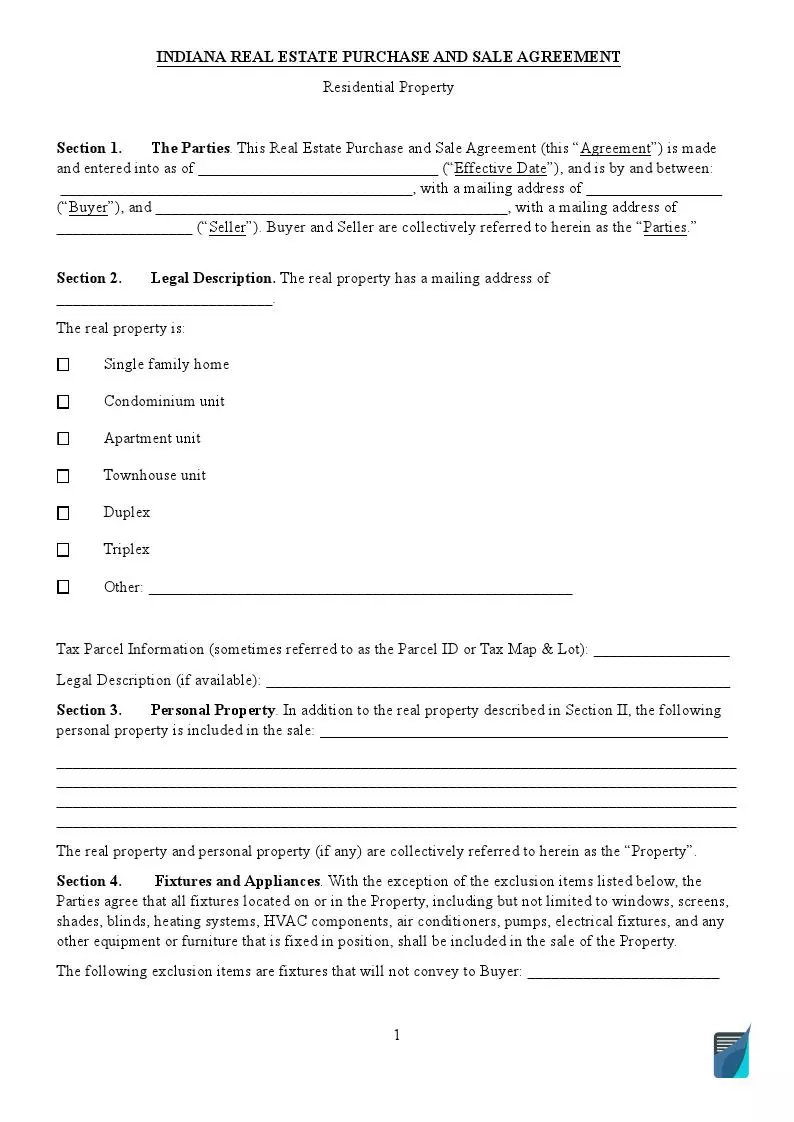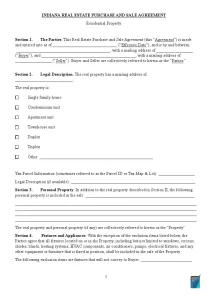Indiana Real Estate Purchase Contract
A real estate purchase agreement is a legally binding form affirming the deal of selling or buying residential or commercial real property and specifying other transaction-related data in the state of Indiana.
All special conditions and prerequisites are negotiated between the parties in advance and clearly outlined in the purchase agreement. The agreement enters into force once the licensee or seller and the buyer countersign the document.
Though certain features to include in the fillable real estate sales contract are variable and mutually negotiable, eventually, both parties are expected to indicate in their deal the following crucial points
- Personal details about each party
- The agreement terms
- Liabilities of both sides
- Cost of the premise
- Other crucial financial instances
- Actual closing dates
- Both parties’ signatures

Build Your Document
Answer a few simple questions to make your document in minutes
Save and Print
Save progress and finish on any device, download and print anytime
Sign and Use
Your valid, lawyer-approved document is ready
Indiana Residential Purchase and Sale Agreement
Residential real estate ownership transfer requires creating an agreement that grants both parties certain obligations, liabilities, and rights. In conformity with Indiana statutes, the landowners/sellers should inform the purchasers about the known damages and potential hazards in their location.
Among the core residential purchase and sale contract components in the state of Indiana are the following:
- Disclosing personal information about both parties (names, mailing addresses, and so on)
- The legal description of the property on sale, its location, physical address, and other info
- Transaction process terms and personal assets involved
- Earnest deposit sum
- Purchase costs and financial options
- Closing prices and conditions
- Title transaction terms
- The property’s condition and its potential defects (if applicable)
- Jurisdiction
- List of other necessary disclosures (if applicable)
- Dispute regulation measures
- Current date and both parties signatures
Indiana Commercial Purchase and Sale Agreement
A legal contract regulating the transaction process between a buyer and a seller regarding commercial property is called a commercial purchase and sale agreement.
The customer is expected to come up with an initial draft of the contract to the seller. On the other hand, the seller can either accept it in its present condition or adjust and counteroffer for a more beneficial price and other provisions. In some instances, the seller may reject the offer without negotiating it.
Now you will familiarize yourself with the essential aspects to be included in the commercial purchase and sale agreement:
- The personal details regarding the property owner and the customer
- Type of real estate
- Bank and seller financing terms and details
- Inspection layouts and period
- Essential disclosure statements
- Default conditions
- Closing dates
- Potential disputes regulations
- Final details (current date, signatures, and so on)
Required Seller Disclosures in Indiana
There are various disclosures in the real property transaction process, so we strongly recommend referring to Indiana Real Estate Disclosure Law to find out more details.
Residential Real Estate Sales Disclosure
First of all, upon Residential Real Estate Disclosure Law, Ind. Code §32-21-5-2, the homeowners have to fill out the basic disclosure form and provide it to the customer. This standard Residential Real Estate Sales Disclosure template is easily accessible online at the State Forms Center. The document serves to specify any known material defects in the premise, which means the ones that would not otherwise seem apparent to the customer. It is highly advisable to establish and strengthen the standard form with additional disclosure statements pointing to:
- Potential structural damages
- Heating or cooling problems
- Termite or rodent issues
- Any natural risks such as location in an area subject to fire hazard, flooding, radiation, or situated close to an airport, and so on.
Besides, in the state of Indiana, it is obligatory to reveal whether the location was ever used as a methamphetamine lab since extra decontamination procedures are required in such an event.
However, per Ind. Code 32-21-6-5, the landlord does not have to report if the premise was psychologically affected in any way. That is, if a felony or a death incident took place there, or a criminal organization used to conduct its activities in the dwelling being sold, they don’t have to disclose this.
Although the aspects mentioned above might eventually change the customer’s decision, you would increase your credibility as a landlord and outline the uprightness of your deal by providing them publicly. One should never forget that concealing extensive information on the related defects or providing a false report on the premise conditions incurs legal responsibility in Indiana and every U.S. state.
Material Relationship Disclosure
If a broker facilitates the property ownership transfer, a Material Relationship Disclosure is needed to provide the essential details about the material relationships and agency terms and conditions.
Homeowners’ Association
As it follows from § 32-21-5-8.5, if the property on sale is subject to the Homeowners’ Association’s terms and regulations, the homeowner must provide the buyer with all the required governing documents related to the Homeowners’ Association.
This organization has the right to impose mandatory dues and other requirements on the homeowners association’s members. To learn more, we kindly offer you to refer to the Indiana Homeowners Association Act, Code § 32-25.5, which regulates the establishment, administration, functions, capabilities, and operation of a homeowners association in the state of Indiana.
Lead-Based Paint Disclosure
This is a nationwide requirement effectuated by 42 U.S. Code § 4852d. Each residential real estate transaction concerning the construction built before 1978 requires accomplishing the disclosure form and providing it to the future customer. The form stating all known facts about the application of lead paints within the premise should come with an additional informational packet enumerating the possible risks of close and prolonged contact with the potentially harmful supplies and materials.
Seller’s Residential Real Estate Sales Disclosure
This is specified in Form 46234 of § 32-21-5-10. According to this form, before confirming the buyer’s offering contract, it is legally binding for the landowner to attach a comprehensive disclosure document mentioned above enumerating the non-evident material deficiencies and flaws concerning the premise under a sales contract.
